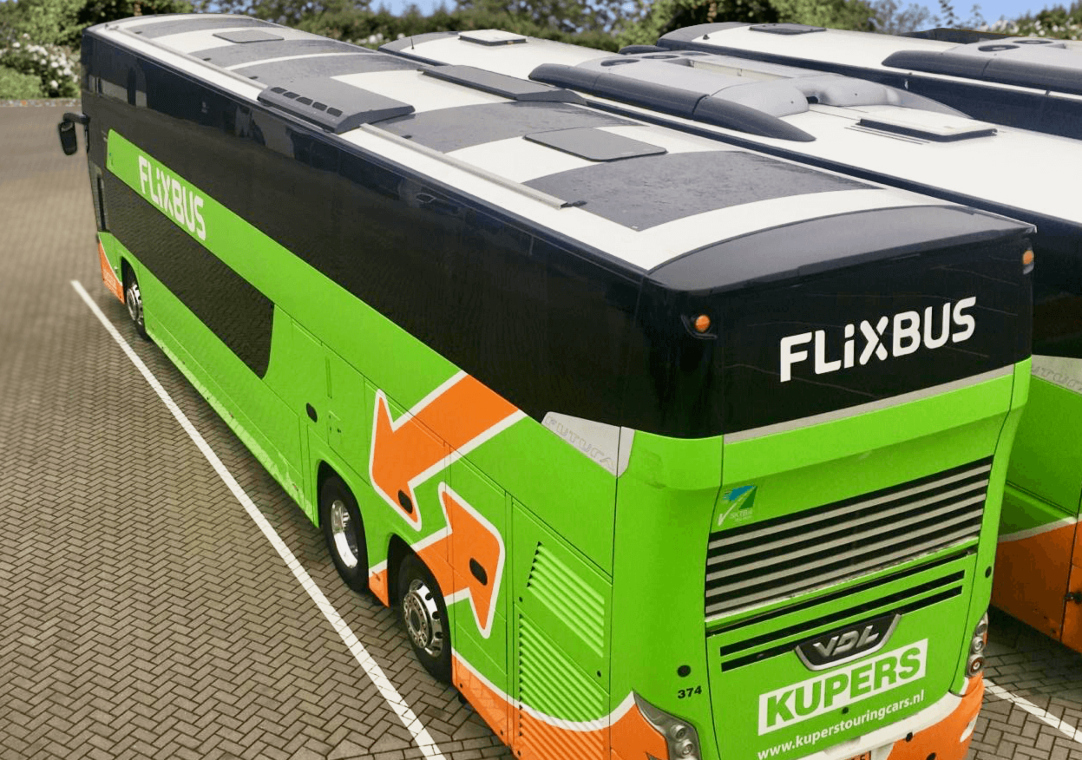Cutting our impact: with your contribution, we can go even further

We believe that everyone should be enabled to reduce their carbon footprint when travelling, no matter what their economic status is. Here, collective means of transport can play a huge role.
When you choose collective travel, you're already making a difference. It's a small change in habit with a big environmental payoff.
Let’s share some figures: an average FlixBus in Europe emits 27.8 g CO2 per person-kilometre. This is at least five times less CO2 than a private car and 10 times less CO2 than a plane.
On top of that, buses almost match the environmental performance of intercity trains, which makes them a great travel alternative, especially in regions that are sparsely connected by rail.
Based on these data (more information here), Flix passengers avoided 1.5 million tonnes of CO2 emissions globally in 2024 just by choosing our services over other means like cars and planes.
As you can see, choosing the right travel solution can help you reduce your impact to a large extent.
And there’s more good news: with a climate contribution, you can take it one step further.
What is a climate contribution?
A climate contribution is a voluntary financial donation that supports verified climate projects aimed at reducing or removing emissions from the atmosphere. It does not offset your trip emissions or lead to climate neutrality – but it enables additional climate action beyond our own value chain. We've partnered with atmosfair, an independent environmental NGO, to make this possible.
Here, the highest project standards certified by the UN, Gold Standard and Carbon Standards International are upheld to ensure your personal climate donation to be truly impactful.
This initiative doesn’t represent a means of direct emissions reduction and therefore doesn’t count towards our own CO2 reduction targets, but it enables us to value what you can do as a passenger.
How does that work?
You can choose to contribute during your booking — the average amount is around 1–3% of your fare*. When booking your FlixBus ticket, simply click the “Climate Contribution” button before you proceed to payment: your donation will be added to your ticket price. With a simple click during your booking process, you can not only reduce the exact emissions of your trip and remove a part of them from the atmosphere, but also directly contribute to funding projects that are aimed at producing a positive impact in the regions where Flix operates.
Where does your climate contribution go?
75%: atmosfair's climate projects
Most of the projects developed by our NGO partner atmosfair take place in regions of the Global South** and are carbon-saving projects. Others are projects actively removing carbon from the atmosphere.

Clean Cookstoves in Rwanda
In rural Rwanda, most people rely on open fires to cook their meals, causing high CO2 emissions, massive deforestation, and health problems from indoor smoke.
Your contribution helps fund the distribution of high-efficiency Save80 stoves, with tangible benefits for the environment and the local communities:
- Reduces wood use by 80%
- Cuts 110,000 tonnes of CO₂ emissions since 2017
- Improves indoor air quality and family health
- Trains over 200 people in stove assembly and distribution
The project, which has received € 2.2 million since 2017, is certified by the UN as well as the Gold Standard***, and is regularly audited independently, ensuring transparency and accountability.
In 2022, a Save80 factory opened in Kigali, producing 40,000 cookstoves yearly and helping ensure Rwanda’s independence from fuelwood and employment and training opportunities for locals.

As of August 2025, your contribution will support a new carbon removal project in India where efficient wood gas stoves are used to combat deforestation and indoor air pollution. These stoves, based on TLUD pyrolysis technology, cut firewood use by 50%, produce charcoal as a by-product, and support sustainable development across rural communities. You can find the latest project updates here.

25%: Future of Mobility Fund
The Future of Mobility Fund was set up by Flix and atmosfair in 2018 to enhance sustainable mobility initiatives in the communities where Flix operates. Projects are chosen for their emission reduction potential and social impact.
From the lab onto the road: here's how you help us speed up fleet transformation
Together with our partners, we strive to accelerate the transition to full decarbonisation and help anyone reduce their impact on the planet, while staying easy on the wallet.
Here, one big challenge is that zero-emission technologies are hardly scalable for long-distance coaches as of today, and sometimes low-emission technologies also pose a challenge.
Therefore, while we engage with primary industry partners to enable scalability of these solutions tomorrow, we try to limit our impact already today with cleaner alternatives to Diesel.
Some of these pilot projects have been enabled with your support. With your climate contributions, you have already helped us:
- Pioneer the first long-distance electric coach in Germany
- Pioneer our first biogas-powered coaches in the Benelux region and Scandinavia
- Bring ten coaches equipped with solar panels on the road in five countries
- Investigate fuel cell technology for hydrogen-powered long-distance coaches
Check out our dedicated page if you want to know more about our fleet transformation projects, including those enabled also by our passengers’ contributions!
Other projects that have become reality thanks to your climate contribution:
- 17 e-cargo bikes delivered to NGOs like Foodsharing, Caritas, and Tafel for food distribution
- 32 climate awareness classes for schoolchildren across Europe
- A solar power system and plug-in hybrid vehicle for SOS Children’s Village in Sarajevo



And we walk the talk ourselves!
Flix also calculates all our employees' business travel emissions worldwide and financially contributes to climate projects in Rwanda and India as well as the Future of Mobility Fund. You can find our own contribution certificate here.

©Flix SE
The importance of joining forces: we contribute to climate action together
We have committed to the Science Based Target initiative and submitted near-term targets for emission reduction to achieve by 2032.
The SBTi validated these near-term targets in April 2024, thereby acknowledging that our strategy is in line with global climate goals.
On this journey towards decarbonisation, we follow a holistic climate strategy that rests on three principles: Avoid, Reduce, and Contribute.
- We help our passengers avoid CO2 emissions by providing them with collective solutions that have a lower emission factor per passenger-km compared to other modes****.
- We enhance fleet transformation with alternative drives and fuels from battery electric to biogas to reduce the CO2 emissions of our operations.
- Despite these efforts, some emissions remain unavoidable — for now. And that's why we cooperate with passengers, environmental NGOs, and industry stakeholders so that we can contribute to global climate goals together. On one side, we join forces with first-tier industrial partners to enable the scale-up of low and zero-emission solutions for long –distance transport. At the same time, we contribute together with our passengers and NGOs through independently verified carbon reduction and removal projects that deliver real impact, without them counting towards our own CO2 reduction target.
How we ensure credibility and compliance
We believe climate contributions must meet the highest standards of transparency and accountability. That’s why we follow these principles:
- No misleading claims: we do not advertise trips as “carbon neutral” or “climate neutral” based solely on contributions. This aligns with the EU consumer protection law and the upcoming Green Claims Directive.
- Certified projects only: we work exclusively with atmosfair, whose projects meet strict standards such as Gold Standard,UN CDM as well as Carbon Standards International for removal projects.
- Full transparency: all methodologies for emission calculations, project audits, and climate impacts are publicly documented and updated annually.
- Impact reporting: we regularly publish impact overviews in collaboration with atmosfair to show how and where your contributions are used.
Every Click Counts
Choosing Flix is already a step towards lower-carbon travel. Add a climate contribution, and you help drive change beyond your journey – supporting communities, innovation, and a cleaner future for all.
* On average, travelling with FlixBus in Europe results in 27.8 grams of CO2 emitted per passenger per kilometre. This gives the total emissions from your journey when multiplied by the distance of your trip. Emission factors used in this analysis were derived from the 2021 Well-to-Wheel analysis conducted by atmosfair. We are committed to update the factors once we complete new analysis on our fleet. This comprehensive approach considers emissions throughout the entire lifecycle of a fuel, from its extraction (well) to its consumption (wheel). The Well-to-Tank emissions represent the standard value for diesel outlined in European norm EN 16258. The Tank-to-Wheel portion of emissions was calculated per passenger kilometre, leveraging our fuel consumption data. Subsequently, the calculated emission factors were multiplied by the weighted price averages of saving (e.g. 96,5%) and removing (e.g. 3,5%) a ton of CO2 to determine price per passenger kilometre, which can then be multiplied by the distance of your trip to compute the total cost of climate contribution of your journey based on its emissions.
** Please see the validation report available here: CDM-PoA-RCPV-FORM.
*** The Gold Standard was established by environmental organisations under the leadership of WWF to ensure that CDM (Clean Development Mechanism) projects actually contribute to sustainable development. It pays particular attention to the extent to which projects contribute to the 17 United Nations Sustainable Development Goals (SDGs) when approving and auditing projects.
**** For more information, see Flix’s 2024 Avoided Emissions Methodology

 Български
Български
 Bosanski
Bosanski
 Català
Català
 Čeština
Čeština
 Dansk
Dansk
 Deutsch
Deutsch
 Deutsch
Deutsch
 Deutsch
Deutsch
 Eesti
Eesti
 Ελληνικά
Ελληνικά
 English
English
 English
English
 English
English
 English
English
 English
English
 English
English
 English
English
 Español
Español
 Español
Español
 Español
Español
 Español
Español
 Français
Français
 Français
Français
 Français
Français
 Français
Français
 Hrvatski
Hrvatski
 Italiano
Italiano
 Italiano
Italiano
 Latviešu
Latviešu
 Lietuvių
Lietuvių
 Magyar
Magyar
 Македонски
Македонски
 Nederlands
Nederlands
 Nederlands
Nederlands
 Norsk (bokmål)
Norsk (bokmål)
 Polski
Polski
 Português
Português
 Português
Português
 Română
Română
 Shqip
Shqip
 Slovenčina
Slovenčina
 Slovenščina
Slovenščina
 Srpski
Srpski
 Suomi
Suomi
 Svenska
Svenska
 Türkçe
Türkçe
 Українська
Українська
 中文
中文